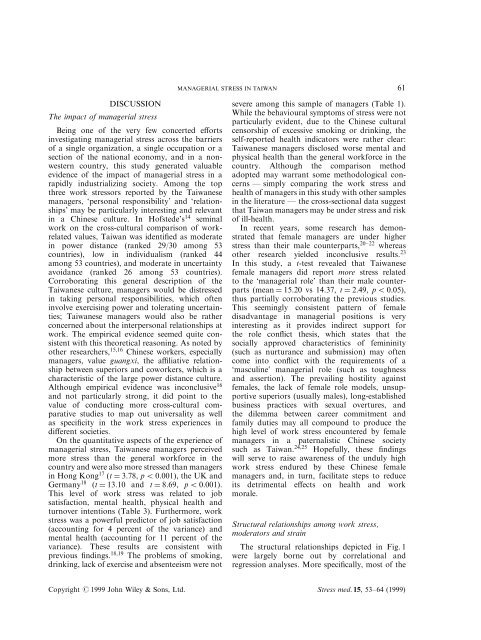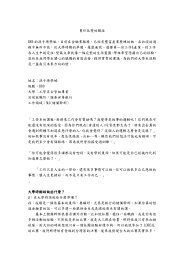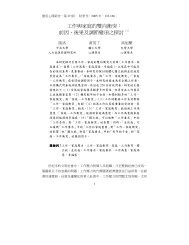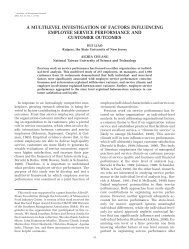Managerial stress, job satisfaction and health in Taiwan
Managerial stress, job satisfaction and health in Taiwan
Managerial stress, job satisfaction and health in Taiwan
Create successful ePaper yourself
Turn your PDF publications into a flip-book with our unique Google optimized e-Paper software.
MANAGERIAL STRESS IN TAIWAN 61DISCUSSIONThe impact of managerial <strong>stress</strong>Be<strong>in</strong>g one of the very few concerted e€orts<strong>in</strong>vestigat<strong>in</strong>g managerial <strong>stress</strong> across the barriersof a s<strong>in</strong>gle organization, a s<strong>in</strong>gle occupation or asection of the national economy, <strong>and</strong> <strong>in</strong> a nonwesterncountry, this study generated valuableevidence of the impact of managerial <strong>stress</strong> <strong>in</strong> arapidly <strong>in</strong>dustrializ<strong>in</strong>g society. Among the topthree work <strong>stress</strong>ors reported by the <strong>Taiwan</strong>esemanagers, `personal responsibility' <strong>and</strong> `relationships'may be particularly <strong>in</strong>terest<strong>in</strong>g <strong>and</strong> relevant<strong>in</strong> a Ch<strong>in</strong>ese culture. In Hofstede's 14 sem<strong>in</strong>alwork on the cross-cultural comparison of workrelatedvalues, <strong>Taiwan</strong> was identi®ed as moderate<strong>in</strong> power distance (ranked 29/30 among 53countries), low <strong>in</strong> <strong>in</strong>dividualism (ranked 44among 53 countries), <strong>and</strong> moderate <strong>in</strong> uncerta<strong>in</strong>tyavoidance (ranked 26 among 53 countries).Corroborat<strong>in</strong>g this general description of the<strong>Taiwan</strong>ese culture, managers would be di<strong>stress</strong>ed<strong>in</strong> tak<strong>in</strong>g personal responsibilities, which often<strong>in</strong>volve exercis<strong>in</strong>g power <strong>and</strong> tolerat<strong>in</strong>g uncerta<strong>in</strong>ties;<strong>Taiwan</strong>ese managers would also be ratherconcerned about the <strong>in</strong>terpersonal relationships atwork. The empirical evidence seemed quite consistentwith this theoretical reason<strong>in</strong>g. As noted byother researchers, 15,16 Ch<strong>in</strong>ese workers, especiallymanagers, value guangxi, the aliative relationshipbetween superiors <strong>and</strong> coworkers, which is acharacteristic of the large power distance culture.Although empirical evidence was <strong>in</strong>conclusive 16<strong>and</strong> not particularly strong, it did po<strong>in</strong>t to thevalue of conduct<strong>in</strong>g more cross-cultural comparativestudies to map out universality as wellas speci®city <strong>in</strong> the work <strong>stress</strong> experiences <strong>in</strong>di€erent societies.On the quantitative aspects of the experience ofmanagerial <strong>stress</strong>, <strong>Taiwan</strong>ese managers perceivedmore <strong>stress</strong> than the general workforce <strong>in</strong> thecountry <strong>and</strong> were also more <strong>stress</strong>ed than managers<strong>in</strong> Hong Kong 17 (t ˆ 3.78, p 5 0.001), the UK <strong>and</strong>Germany 18 (t ˆ 13.10 <strong>and</strong> t ˆ 8.69, p 5 0.001).This level of work <strong>stress</strong> was related to <strong>job</strong><strong>satisfaction</strong>, mental <strong>health</strong>, physical <strong>health</strong> <strong>and</strong>turnover <strong>in</strong>tentions (Table 3). Furthermore, work<strong>stress</strong> was a powerful predictor of <strong>job</strong> <strong>satisfaction</strong>(account<strong>in</strong>g for 4 percent of the variance) <strong>and</strong>mental <strong>health</strong> (account<strong>in</strong>g for 11 percent of thevariance). These results are consistent withprevious ®nd<strong>in</strong>gs. 18,19 The problems of smok<strong>in</strong>g,dr<strong>in</strong>k<strong>in</strong>g, lack of exercise <strong>and</strong> absenteeism were notsevere among this sample of managers (Table 1).While the behavioural symptoms of <strong>stress</strong> were notparticularly evident, due to the Ch<strong>in</strong>ese culturalcensorship of excessive smok<strong>in</strong>g or dr<strong>in</strong>k<strong>in</strong>g, theself-reported <strong>health</strong> <strong>in</strong>dicators were rather clear:<strong>Taiwan</strong>ese managers disclosed worse mental <strong>and</strong>physical <strong>health</strong> than the general workforce <strong>in</strong> thecountry. Although the comparison methodadopted may warrant some methodological concernsÐ simply compar<strong>in</strong>g the work <strong>stress</strong> <strong>and</strong><strong>health</strong> of managers <strong>in</strong> this study with other samples<strong>in</strong> the literature Ð the cross-sectional data suggestthat <strong>Taiwan</strong> managers may be under <strong>stress</strong> <strong>and</strong> riskof ill-<strong>health</strong>.In recent years, some research has demonstratedthat female managers are under higher<strong>stress</strong> than their male counterparts, 20±22 whereasother research yielded <strong>in</strong>conclusive results. 23In this study, a t-test revealed that <strong>Taiwan</strong>esefemale managers did report more <strong>stress</strong> relatedto the `managerial role' than their male counterparts(mean ˆ 15.20 vs 14.37, t ˆ 2.49, p 5 0.05),thus partially corroborat<strong>in</strong>g the previous studies.This seem<strong>in</strong>gly consistent pattern of femaledisadvantage <strong>in</strong> managerial positions is very<strong>in</strong>terest<strong>in</strong>g as it provides <strong>in</strong>direct support forthe role con¯ict thesis, which states that thesocially approved characteristics of fem<strong>in</strong><strong>in</strong>ity(such as nurturance <strong>and</strong> submission) may oftencome <strong>in</strong>to con¯ict with the requirements of a`mascul<strong>in</strong>e' managerial role (such as toughness<strong>and</strong> assertion). The prevail<strong>in</strong>g hostility aga<strong>in</strong>stfemales, the lack of female role models, unsupportivesuperiors (usually males), long-establishedbus<strong>in</strong>ess practices with sexual overtures, <strong>and</strong>the dilemma between career commitment <strong>and</strong>family duties may all compound to produce thehigh level of work <strong>stress</strong> encountered by femalemanagers <strong>in</strong> a paternalistic Ch<strong>in</strong>ese societysuch as <strong>Taiwan</strong>. 24,25 Hopefully, these ®nd<strong>in</strong>gswill serve to raise awareness of the unduly highwork <strong>stress</strong> endured by these Ch<strong>in</strong>ese femalemanagers <strong>and</strong>, <strong>in</strong> turn, facilitate steps to reduceits detrimental e€ects on <strong>health</strong> <strong>and</strong> workmorale.Structural relationships among work <strong>stress</strong>,moderators <strong>and</strong> stra<strong>in</strong>The structural relationships depicted <strong>in</strong> Fig. 1were largely borne out by correlational <strong>and</strong>regression analyses. More speci®cally, most of theCopyright # 1999 John Wiley & Sons, Ltd. Stress med. 15, 53±64 (1999)
















